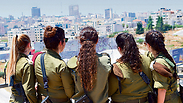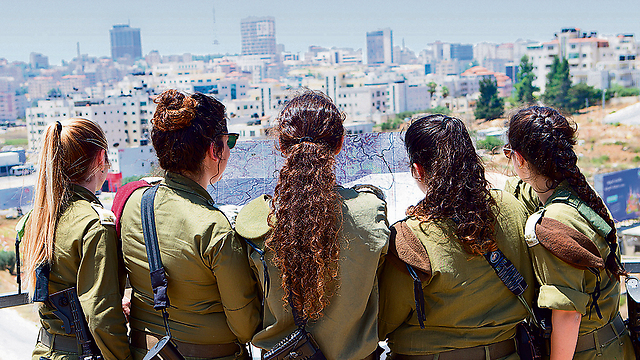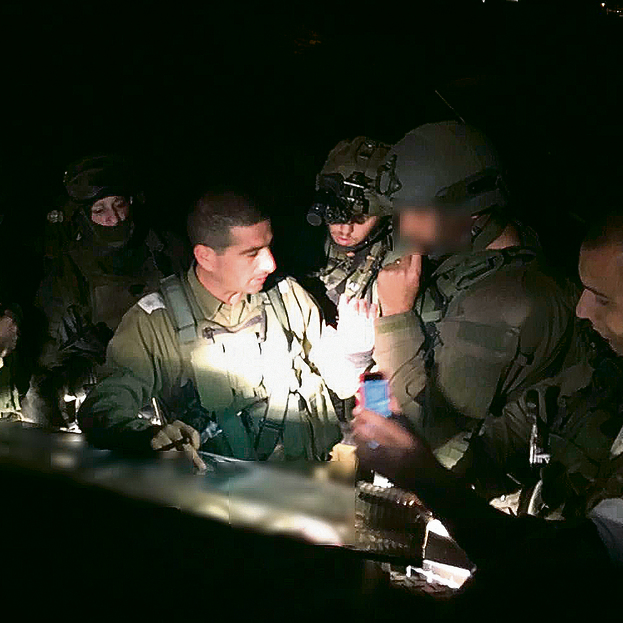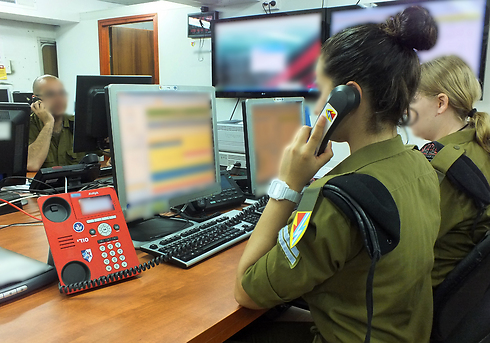
Women of war: Meet the IDF's special operations officers
When IDF Special Forces go on covert operations, they receive crucial information from the special operations officers at the situation room. The Judea and Samaria Division's five special operations officers talk about their challenging jobs and sleepless nights.
Tuesday, July 26, 2016, 9:55pm: The phone in the Eztion Brigade's situation room is ringing. An intelligence officer is on the line. "There is an indication that the terrorist has arrived at the destination," he reports to the territorial brigade's special operations officer, Lt. P.
"Within 20 minutes, we had forces inside the village," Lt. P. recalls. "I sent ten different units into Surif, among them were five Special Forces units that were scrambled to the area: The Border Police's counter-terrorism unit (Yamam), Duvdevan, and others. This was the beginning of a procedure known as 'pressure cooker' (code name for surrounding a terrorist who barricaded himself in a house). The adrenaline was insane: Sky-high excitement as we were all watching on the monitors. I organized the forces around the house. The village was still quiet. All of a sudden, we found ourselves in a state of crazy uncertainty. It turned out that the terrorist wasn't there. For a week, information was flowing to us that he was moving between the villages in the Hebron and Etzion area. We had concrete information that he was planning to carry out a shooting attack in the immediate future, and all of a sudden he went missing on us.

"The clock was ticking. There was immense pressure in the situation room. Then, a gun battle erupted. It was like the Wild West. The shots were coming from houses and rooftops. Then, a sigh of relief: The terrorist was sighted on one of the building's floors. We used a bulldozer, which took a 'bite' out of one of the sides of the house. We gave the terrorist time to surrender, but the shooting continued. He refused to come out. We started demolishing the house. Later, I spoke on the phone to S., the officer in charge of special operations in the Judea District. She asked me, 'did you get him?' and I answered 'yes.' I felt a tremendous sense of satisfaction, a little rest after almost a month."
That is how Lt. P. directed the forces that eliminated the terrorist Mohammed al-Fakih, who murdered Rabbi Miki Mark in Mount Hebron, about a month prior.
'Why aren't the forces moving?'
The interview with the five special operations officers, all women, took place in the Judea and Samaria Division headquarters. This is a position that only exists in the Judea and Samaria Division and is filled—almost exclusively—by young, female officers who are about 22 years old and hold the rank of lieutenant.
Their weapon is an encrypted cellular device known as the "Mountain Rose," which they don't let out of their sight for a moment, constantly stepping out during the interview to talk to commanders and prepare them for the next operation. Their eyes are red with exhaustion and they're fueled with massive amounts of coffee and adrenaline.
"One time, I decided to count the number of calls I made in a day," said Lt. E., the Ephraim Brigade's (Qalqilya area) special operations officer. "I got to 400, but during the last wave of terror attacks, I think I got to more."
Their names and faces cannot be published, due to the sensitive nature of their position. Each one of them has at her disposal phone numbers of the commanders and officers of some of the IDF's elite units, the Shin Bet, the Yamam, and the Israel Police.
From the moment they receive confirmation, they are in charge of deploying the Special Forces, positioning them and coordinating between them so as to prevent a situation of friendly fire.
“Each operation is incredibly nerve-racking,” said R., a special operations officer at the Binyamin Brigade. “I look at the monitor and see that a unit I instructed to move left is actually moving right, which makes me realize that we had lost communications with it. The brigade commander starts yelling in the war room, ‘Why isn’t that unit moving?’ The pressure is unreal. And then the unit responds and I immediately yell, ‘go left!’ And now, somehow, I need to explain the communications glitch to the brigade commander."
S., the special operations officer of the Menashe Brigade (Jenin area), enlisted in the IDF in October 2012. She served as a lookout on the Lebanon border and then served as the aid to the 36th Division's operations officer during Protective Edge n 2014. It was under the 36th Division that the Golani Brigade fought some difficult battles in Saja'iyya.
"One night, we were at the Operations Directorate and our commanders told us an operation is probably about to start," she remembers. "The next day, we were to leave the Golan Heights and head to the gathering areas outside Gaza, where we then managed the division's situation room. There, the entire operation unfolds in front of you, and you find yourself in the midst of everything. I remember Golani's APC disaster. I remember knowing what happened to the soldiers and having to exercise restraint and not cry, while the emotions came flooding and I was hurting for every name that came up. The situation is complex, but the experience is different. You're not at home listening to the news. You're in the midst of fighting and have no time to dwell on the pain. One event follows another, and you have to stay as professional as possible."
E., the special operations officer of the Ephraim Brigade, enlisted in January 2013 as an infantry instructor and later served as a coordinations officer in the Central Command's headquarters.
R., the special operations office of the Binyamin Brigade, enlisted in October 2012 and served as a situation room's commander at the 80th Regional Division—which is in charge of the Arabah region, Eilat, and a large part of the Egyptian border—and a team commander at a course for field unit officers.
S., the special operations officer of the Judea Division, also enlisted in October 2012, and served as the operations NCO of the Etzion Regional Division. After attending officers' course, she became a situation room commander in the 769th Regional Division on the Lebanon border.
P., the special operations office of the Etzion Division, enlisted in July 2013 and served as an anti-tank weapons instructor. Later, she was a team commander at officers' course.
Most of them entered their current position in the fall of 2015, at the beginning of the wave of terror attacks, and very quickly found themselves in the midst of daily fighting.
“There are weeks when we hardly get any sleep,” S. says. “I knew what I was getting into, but I didn’t know how intense everything would be."
Immediately following a terrorist attack, says Lt. E., she and her colleagues begin exchanging messages to figure out where the terrorist came from. “Once you realize he came out of your area, you know you’re not going to be getting any sleep over the next few days,” she says.
Shortly after starting at her position as the Judea Brigade's special forces officer, S. had to deal with one of the most serious terrorist attacks of the latest wave of violence. In January, a Palestinian teenager, entered the Israeli settlement of Otniel and murdered Dafna Meir in front of her children. The terrorist, 16-year-old Morad Adais, managed to escape back to his village.

"I was in the war room, and I heard 'open circle' on the comms, which is the code for an infiltration into one of the settlements," recalls S. "You immediately realize this might be a very serious incident. And this is the first time I had to manage such an incident. There was a lot of tension and stress. We had to find the terrorist. We formulated an initial assessment of the situation with the help of the Shin Bet and Military Intelligence. The hours passed. And then we fortunately got testimony bt one of the settlers, who described the terrorist.
"I got the order and started gathering the forces. I had a lot of Special Forces units taking part in this operation, even airborne ones. An unfathomable (amount of) responsibility. (The forces) got into the village of Beit Imra near Yatta and met with no real resistance. Then, they found him sitting in his living room. The tension was replaced by a certain feeling of satisfaction."
And at the same time, are you thinking of the woman who was murdered, or are you focused solely on the mission at hand?
"You can't not think about it. It's hard and perhaps unbelievable, but during the operation you have to separate (these things). Sometimes I think of the victims and get choked up. It's a feeling that's hard to explain."
Do you go out into the field?
"I often go out into the field with the senior commanders, but most of the time they prefer that I remain in the situation room and give them an accurate view of things. Inside the situation room, when you have the entire array of forces and missions in front of you, you know what each force is supposed to be doing and you have to coordinate between them. It's a different feeling from being in the field, very challenging and stressful," says Lt. S.
S. has been in her position for nearly 10 months. She wears a brown military beret, in memory of her brother, Golani Brigade fighter
Staff Sgt. Itamar Shai, who was killed in the IDF's helicopter disaster of February 1997.
"He was killed when I was three, so I didn't really know him. My memories of him are blurry, just fractions of memories of playing together when he came home from the army. I mostly heard stories about him by friends and family. They always spoke about him takng care of those weaker than him. It's hard for me to not have him here beside me."
When she became a situation room officer, in the 769th Regional Brigade where her brother had died, it marked a kind of closure for S. "My commanders believed that serving where my brother was killed would be meaningful for me. It wasn't easy, but I really felt I was commemorating him this way."
Another sleepless night
One of the gravest incidents in IDF of the past few years occurred in the West Bank on February 29, 2016. "Around 10pm, the phone rang," R., the Binyamin Brigade's special operations officer, remembers. "An officer from Oketz (the IDF's special forces canine unit) was on the line. 'Two soldiers got lost in Ramallah,' he told me. Chaos immediately erupted. Meanwhile, I started getting reports of stone-throwing and Molotov cocktails (being hurled) at a military vehicle in Qalandiya. I asked the officer if the lost soldiers were in Ramallah or Qalandiya, he didn't know the answer. Soon, we realized everything was happening in Qalandiya. I immediately thought of the lynch in Ramallah."Within seconds, the situation room was flooded with senior officers. Lots of shouting, many orders. And I started sending a massive amount of forces to Qalandiya. It's massive responsibility, making sure everyone is safe and coordinating between them. I sent all the forces I had there, hundreds of soldiers. At a certain point, we found the vehicle, which was (damaged by being) pelted with stones. At that point, contact with the soldiers was lost. It's a suffocating feeling, helplessness. We found one of the soldiers hiding in a neighborhood trash container, but the event wasn't over. Another soldier was missing, with whom contact had been lost. Everyone was going crazy.
"Serious rioting began at that point. Qalandiya is a difficult place. Molotov cocktails, stones. The forces I sent in kept searching. There was major concern over the possibility of friendly fire. After half an hour, I got a phone call: The soldier was found near the fence of the settlement Kokhav Ya'akov. Everyone calmed down. The situation room emptied out. But I still needed to get the forces out (of the area), and continue the operation of capturing the stone and Molotov cocktail-throwers. It takes until morning. Another sleepless night."
In the Ephraim region, things are slightly calmer. The IDF mostly operates to prevent terror attacks there, actions that don't always make headlines.
"There's a settlement in the Samaria region where dozens of attacks have been foiled," says Ephraim special operations officer Lt. E. "We foil an infiltration attempt there three or four times a month. Once, we caught two kids with knives there, and they admitted that they were going there to commit an attack. Later, we learned that a relative of theirs was killed when he tried to stab a soldier in Huwara, which is in the Samaria region. So we monitor relatives of terrorists who were killed and conduct operations to arrest those who raise concerns. It's true that there's a lot less stress. But we're still saving lives."
With all of the intensity of the job, it's easy to forget we're talking about young women, who are dealing with complex situations and who carry the heavy burden of responsibility on their shoulders. Only few others their age have to handle such responsibility every day. They try to also lead normal lives—with families, friends, dating, and fun—but it's not always possible.
"Just a few days ago I went on a date, the first in a long time," says E., "We sat at a café and suddenly (the phone started ringing) and I had to answer it. I disappeared for 40 minutes. It was terribly embarrassing. I then returned to the table and the date continued, but we haven't spoken since. I don't know if it'll go on."
But despite the difficulties, two of the ladies are in relationships. "On one of my leaves, I took my partner to meet my friends," says Lt. S. "It was after we haven't seen each other in a long time. I wore a special, pretty dress. We went out, I introduced them. Suddenly the phone started ringing. 'There is an indication (we found) a wanted suspect, you need to come back to base quickly.' And I, with this dress on, jumped into the car and rushed to the situation room. I had a spare set of my combat uniform in my car. I started changing, and then I realized I left my boyfriend with a bunch of people he doesn't know."
The special operation officer of the Judea Brigade, whose first initial is also S., has a partner as well. "We seldom see each other, but try to keep our heads above water," she says.
"A day before the terrible murder of Hallel Ariel, I got to go home after a whole month, because my cousin was getting married. The wedding was set for Thursday. I was at home, getting ready, and all of a sudden the phone started ringing. Infiltration into Kiryat Arba. Without thinking twice, I took the car and drove to the situation room, hoping to get it all done on time to come back for the wedding. It didn't happen. I sent large amounts of forces into the village of Bani Na'im to find the terrorist's home. On Friday morning, the brigade commander told me, 'you're dismissed.' I was disappointed because I missed the wedding, but at least I was going to be home for Shabbat. (As soon as) I got home, there was an attack on Highway 60—the drive-by shooting on the Mark family's car. So again, I drove my private vehicle back to base, this time for two weeks. I didn't get to see my boyfriend."
Lt. E. is a religious woman, who has to nevertheless have her phone with her on Shabbat as well, because of her duties. She has been trying to balance her faith with her operational duty. "Every religious person knows that Shabbat is when you disconnect from it all and connect to God in your own way. You press pause on life. I go to prayer with my phone on, and when there's an operational need, I find myself speaking on the phone on Saturday as well. On one of my weekends off, I didn't feel like I was not on base. There were constant phone calls. It doesn't stop and you can't control it."
The special operations officers' crazy schedule and their work environment are a surefire recipe for stress. But the importance of their position and the enormous responsibility it carries with it give them the strength to go on.
"I won't say it's pleasant, being in the company of men who came from the battlefield and need to take instructions from a 22-year-old female officer, but they show us respect," said S., the Menashe officer. "We meet with senior commanders: Battalion commanders, brigade commanders, and commanders of elite units. It's a little intimidating, but also really emphasizes my responsibility. When a battalion commander is demanding answers of me about the forces operating in his area, I realize how much responsibility this job carries. The most important thing is to show confidence and professionalism and ignore any background noise. It's not simple. You're always under scrutiny."
Events keep following them even after the forces return to base. "I dealt with the attack on Shlomit Krigman, who was murdered in January in Beit Horon," says R., the Binyamin officer. "She was a woman about my age. It's incomprehensible that a woman at the beginning of her life is murdered inside her settlement. It's difficult and unrelenting, but I have to make that separation. And when a terrorist's home is demolished, there's no feeling of relief, but there is closure. And the fact the military goes into a village and controls it for a few hours while demolishing the terrorist's home aids in deterrence and can prevent future attacks. Not everyone gets to take part in the fight against terrorism."












